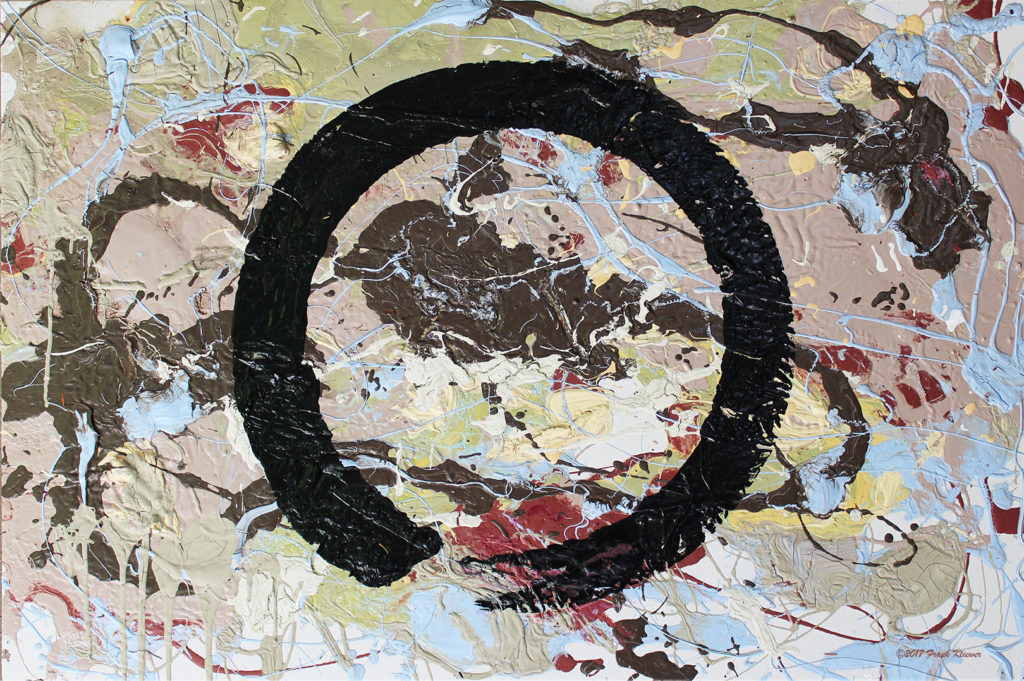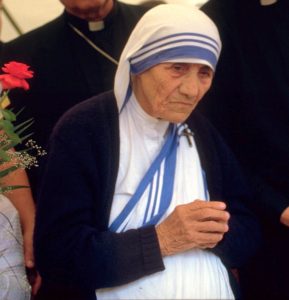
This acrylic and oil painting is on a 24×36 canvas.
Title: Inner Peace
Courage is the choice and willingness to confront agony, pain, danger, uncertainty or intimidation. Physical courage is courage in the face of physical pain, hardship, death or threat of death, while moral courage is the ability to act rightly in the face of popular opposition, shame, scandal or discouragement.
Wikipedia
Keeping a positive frame of mind can at times be a challenge for anyone, especially during this challenging economic climate. It’s important that you remember that staying positive is vital to being successful in life. You’ll find things a lot easier to deal with if you’re in the right frame of mind, so to help you along the way here are 6 steps tokeeping a positive attitude, even when times are hard.
 1. Don’t over-think things.Stay focused on what’s happening right in front of you, as keeping your mind on the matters at hand will also help you work more efficiently. If you worry about things you can do nothing about, then they tend to build up in your head and cause more stress.
1. Don’t over-think things.Stay focused on what’s happening right in front of you, as keeping your mind on the matters at hand will also help you work more efficiently. If you worry about things you can do nothing about, then they tend to build up in your head and cause more stress.
2. Think and speak positively.Complain less and compliment more because positive speech will create a positive atmosphere around you. Look for the good in everything and if you can find nothing constructive to say about a situation, then don’t say anything at all. Complaining and moaning can bring everyone’s mood down, including your own. Voice your problems and concerns constructively, don’t allow them to seep out in a negative way. If something untoward happens, take time to reflect upon the situation, analyze what you’ve learnt from it and look for any possible positives.
3. Surround yourself with positive people.It’s all well and good thinking positively, but if others around aren’t doing the same then they can bring about a negative attitude. We tend to emulate the people we spend large amounts of time with, so if you find someone in your peer-group or a member of your family is constantly negative, don’t let them bring you down. Surrounding yourself with positive-thinking people, or people in positions which you aspire to be in, can also help you learn new ways to stay optimistic and give you the motivation you need to maintain an optimistic outlook.
4. Look forward.Giving yourself challenging yet achievable goals will help you feel an extra sense of worth when you complete them. This will also give you something to look forward to. Lay out a future plan and be sure to reward yourself whenever you carry out your current goals. Break each month, week or even day down so that you can take every task as it comes. Work to your own expectations and don’t rely on judgement from others; but give your best to every piece of work you.
5. Let go of past grudges.Making your peace with any negative thoughts that are still haunting you will leave you feeling relieved and allow you to positively move forward in your life. It’s understandable that everyone gets angry occasionally, but work to resolve these issues as soon as they arise. Leaving things to fester will only result in them becoming worse the longer you leave them. Hating someone has no benefit to anyone, but you may find yourself learning more by accepting people and making new friends.
6. Love yourself.No matter what happens, you are responsible for you. Although your peers may be great for lifting your mood, if they’re not available that’s no excuse to feel low. Investing time in yourself can not only help you feel better, but it can also help you better understand why you feel the way you do.
Original Source:
http://www.wikihow.com/Create-and-Sustain-a-Positive-Mental-Attitude,-Especially-During-Tough-Times

The age of loneliness is killing us
By George Monbiot
Published in The Guardian, Tuesday 14 October 2014
What do we call this time? It’s not the information age: the collapse of popular education movements left a void filled by marketing and conspiracy theories. Like the stone age, iron age and space age, the digital age says plenty about our artifacts but little about society. The anthropocene, in which humans exert a major impact on the biosphere, fails to distinguish this century from the previous 20. What clear social change marks out our time from those that precede it? To me it’s obvious. This is the Age of Loneliness.
When Thomas Hobbes claimed that in the state of nature, before authority arose to keep us in check, we were engaged in a war “of every man against every man”, he could not have been more wrong. We were social creatures from the start, mammalian bees, who depended entirely on each other. Thehominins of east Africa could not have survived one night alone. We are shaped, to a greater extent than almost any other species, by contact with others. The age we are entering, inwhich we exist apart, is unlike any that has gone before.
Three months ago we read that loneliness has become an epidemic among young adults. Now we learn that it is just as great an affliction of older people. A study by Independent Age shows that severe loneliness in Englandblights the lives of 700,000 men and 1.1m women over 50, and is rising with astonishing speed.
Ebola is unlikely ever to kill as many people as this disease strikes down. Social isolation is as potent a cause of early death as smoking 15 cigarettes aday; loneliness, research suggests, is twice as deadly as obesity. Dementia, high blood pressure, alcoholism and accidents – all these, like depression, paranoia, anxiety and suicide, become more prevalent when connections are cut. We cannot cope alone.
Yes, factories have closed, people travel by car instead of buses, use YouTube rather than the cinema. But these shifts alone fail to explain the speed of our social collapse. These structural changes have been accompaniedby a life-denying ideology, which enforces and celebrates our social isolation. The war of every man against every man – competition and individualism, in other words – is the religion of our time, justified by a mythology of lone rangers, sole traders, self-starters, self-made men and women, going it alone. For the most social of creatures, who cannot prosper without love, there is no such thingas society, only heroic individualism. What counts is to win. The rest is collateral damage.
British children no longer aspire to be train drivers or nurses – more than a fifth say they “just want to be rich”: wealth and fame are the sole ambitions of 40% of those surveyed. A government study in June revealed that Britain is the loneliness capital of Europe. Weare less likely than other Europeans to have close friends or to know our neighbours. Who can be surprised, when everywhere we are urged to fight like stray dogs over a dustbin?
We have changed our language to reflect this shift. Our most cutting insult is loser. We no longer talk about people. Now we call them individuals. So pervasive has this alienating, atomising term become that even the charities fighting loneliness use it to describe the bipedal entities formerly known as human beings. We can scarcely complete a sentence without getting personal. Personally speaking (to distinguish myself from a ventriloquist’s dummy), I prefer personal friends to the impersonal variety and personal belongings to the kind that don’t belongto me. Though that’s just my personal preference, otherwise knownas my preference.
One of the tragic outcomes of loneliness is that people turn to their televisions for consolation: two-fifths of older people report that the one-eyed god is their principal company. This self-medication aggravates the disease. Research by economists at the University of Milan suggests that television helps to drive competitive aspiration. It strongly reinforces the income-happiness paradox: the fact that, as national incomes rise, happiness does not rise with them.
Aspiration, which increases with income, ensures that the point of arrival, of sustained satisfaction, retreats before us. The researchers found that those who watch a lot of TV derive less satisfaction from a given level of income than those who watch only a little. TV speeds up the hedonic treadmill, forcing us to strive even harder to sustain the same level of satisfaction. You have only to think of the wall-to-wall auctions on daytime TV, Dragon’s Den, the Apprentice and the myriad forms of career-making competition the medium celebrates, the generalised obsession with fame and wealth, the pervasive sense, in watching it, that life is somewhere other than where you are, to see why this might be.
So what’s the point? What do we gain from this war of all against all? Competition drives growth, but growth no longer makes us wealthier. Figures published this week show that, while the income of company directors has risen by more than a fifth, wages for the workforce as a whole have fallen in real terms over the past year. The bosses earn – sorry, I mean take – 120 times more than the average full-time worker. (In 2000, it was 47 times). And even if competition did make us richer, it wouldmake us no happier, as the satisfaction derived from a rise in income would be undermined by the aspirational impacts of competition.
The top 1% own 48% of global wealth, but even they aren’t happy. Asurvey by Boston College of people with an average net worth of $78m found that they too were assailed by anxiety, dissatisfaction and loneliness. Many of them reported feeling financially insecure: to reach safe ground, they believed, they would need, on average, about 25% more money. (And if they got it? They’d doubtless need another 25%). One respondent said he wouldn’t get there until he had $1bn in the bank.
For this, we have ripped the natural world apart, degraded our conditions of life, surrendered our freedoms and prospects of contentment to a compulsive, atomising, joyless hedonism, in which, having consumed all else, we start to prey upon ourselves. For this, we have destroyed the essence of humanity: our connectedness.
Yes, there are palliatives, clever and delightful schemes like Men in Sheds and Walking Football developed by charities for isolated older people. But if we are to break this cycle and come together once more, we must confront the world-eating, flesh-eating system into which we have been forced.
Hobbes’s pre-social condition was a myth. But we are entering a post-social condition our ancestors would have believed impossible. Our lives are becoming nasty, brutish and long.
Original Source: http://www.theguardian.com/commentisfree/2014/oct/14/age-of-loneliness-killing-us
—————————
Almost four years after the world met the global target set in the Millennium Development Goals (MDGs) for safe drinking water, and after the UN General Assembly declared that water was a human right, over three-quarters of a billion people, most of them poor, still do not have this basic necessity, UNICEF said to commemorate World Water Day.
Estimates from UNICEF and WHO published in 2013 are that a staggering 768 millionpeople do not have access to safe drinking water, causing hundreds of thousands of children to sicken and die each year. Most of the people without access are poor and live in remote rural areas or urban slums. UNICEF estimates that 1,400 children under five die every day from diarrheal diseases linked to lack of safe water and adequate sanitation and hygiene.
“Every child, rich or poor, has the right to survive, the right to health, the right to a future,” said Sanjay Wijesekera, head of UNICEF’s global water, sanitation and hygiene program. “The world should not rest until every single man, woman and child has the water and sanitation that is theirs as a human right.”
The MDG target for drinking water was met and passed in 2010, when 89 per cent of the global population had access to improved sources of drinking water — such as piped supplies, boreholes fitted with pumps, and protected wells. Also in 2010, the UN General Assembly recognized safe drinking water and sanitation as a human right, meaning every person should have access to safe water and basic sanitation. However, this basic right continues to be denied to the poorest people across the world.
“What continues to be striking, and maybe even shocking, is that even in middle income countries there are millions of poor people who do not have safe water to drink,” Wijesekera added. “We must target the marginalized and often forgotten groups: those who are the most difficult to reach, the poorest and the most disadvantaged.”
According to UNICEF and WHO estimates, 10countries are home to almost two-thirds of the global population without access to improved drinking water sources. They are: China (108 million); India (99 million); Nigeria (63 million); Ethiopia (43 million); Indonesia (39 million); Democratic Republic of the Congo (37 million); Bangladesh (26 million); United Republic of Tanzania (22 million); Kenya (16 million) and Pakistan (16 million).
Ethiopia is on track to achieve the Millennium Development Goal target related to water-62 per cent of the population should access improved sources of drinking water by2015 against the MDG target of 57 per cent. More than half of the households (54 per cent) have access to an improved source of drinking water, compared to 35 per cent in2005 and 25 per cent only in 2000 (EDHS 2011).
However, the country is lagging behind on sanitation targets. While the MDG target for access to improved sanitation facilities is 51 per cent, only 8.3 per cent (EDHS 2011) ofthe population has access to improved sanitation. Children in school are especially vulnerable as the National Water Sanitation and Hygiene (WASH) Inventory data shows that only 33 per cent of school have improved sanitation facilities for students and teachers, and only 31 per cent have access to water.
“While the theme this year is the inter-linkage between water and energy, we should focus on women and children as the primary beneficiaries of water in Ethiopia,” saidSamuel Godfrey, Chief of WASH in UNICEF Ethiopia.
Huge disparities in the quality of water and sanitation infrastructure lie between the urban and rural area. In most rural areas across Ethiopia, water scarcity, inferior water quality, lack of sanitation facilities and inappropriate hygiene behaviors threaten the well-being of communities. There is also an urgent need to address the issue of separate sanitary facilities. Girls are often reluctant to use facilities, even if they are clean, because toilet blocks and hand washing facilities (important for menstrual hygiene) rarely provide the level of privacy and security they require.
“It is vital that girls should not feel marginalized and lose their self-respect due to lack of WASH facilities in schools. We need to foster an environment where girls maintain their dignity and focus on their school attendance and achievements,” stresses Mr. Godfrey.
In order to harmonize the WASH efforts in the country, the ONEWASH program has been launched in 2013, bringing together four ministries: Water Resources; Health; Education; and Finance & Economic Development. ONEWASH attempts to modernize the way water and sanitation services are delivered; improving the health situation, decreasing the drop-out rates of children in schools, and making financing for Water Sanitation and Hygiene (WASH) more effective. Above all, the program contributes significantly in meeting both the Growth and Transformation Plan (GTP) and the Millennium Development Goals (MDG) targets.
This week, UNICEF launched a global social media campaign to demand action for the 768 million people without access to safe water. Followers on Facebook, Twitter and Instagram will be asked to discuss what water means to them through the use of photography and the hashtag #WaterIs to help raise awareness of what it means to live without access to safe drinking water.
A bird in the forest perches on only one branch at a time. This is the wise persons’ practice.
____________________________

Below is the writing of Mother Teresa, in memory of her work caring for those most in need:
ANYWAY
People are unreasonable, illogical and self-centered.
Love them anyway!
If you do good, people will accuse you
of selfish, ulterior motives.
Do good anyway!
If you are successful, you will win
false friends and enemies.
Succeed anyway!
The good you do will be forgotten tomorrow.
Do good anyway!
Honesty and frankness make you vulnerable.
Be honest and frank anyway!
What you spend years building may be
destroyed overnight.
Build anyway!
People really need help
but may attack you if you help them.
Help them anyway!
Give the world the best you have
and you’ll get kicked in the teeth.
Give the world the best you’ve got anyway!
Written by: Mother Teresa
Capt. William H. Wincapaw, known as an adventurous and skilled Airman, unknowingly began a tradition in 1929. He was just a guy that wanted to bring holiday cheer to the lighthouse keepers along the East Coast by dropping packages of toys, coffee, shaving supplies, and snacks around Christmas time. He soon became known by the light keepers as the Flying Santa. Over the decades the planes and pilots changed, but except for a break during World War II, the practice continues today, now by helicopter.
This Christmas, Frank wanted to pay special tribute to the new Airman in the family, his grandson Griffyn. So, a new 30″ x 24″ acrylic on wood panel painting shown below is added today to Frank’s lighthouse series. The lighthouse seen in this painting is the Boston Light.

This painting honors those who take special care of the all-important light keepers, as well as the remote Coast Guard outposts.
Now as Griffyn has his first Christmas away from home in the Air Force, we wish him and his group a safe and enjoyable Christmas, as we thank all those who bless and protect us from above.
by ERIC WILKINSON / KING 5 News
KING5.com
Posted on January 5, 2012 at 6:07 PM
In many of our Making a Difference stories, we tell you about little-known heroes in the community. But this story in about someone you probably already know, former Seattle Mariner John Olerud.
He was an All-Star at the top of his game in 2000. Money, fame, and adored by his hometown fans. Olerud had it all, but that same summer he and his family were hit with a devastating disorder.
John’s daughter Jordan was born with an incredibly rare chromosome disorder leaving her unable to walk on her own, or even speak.
“It was definitely an eye opener that things don’t always go the way you’ve planned,” he said.
The Lundquist family knows that same heartache of broken plans. Their son Koby suffered a severe asthma attack in 2010, and a lack of oxygen left him permanently brain damaged.

While their struggles are similar, there is one glaring difference — the Oleruds have the means to put their daughter through special therapies, like those offered at Woodinville’s Little Bit Therapeutic Riding Ranch, helping Jordan make great advances.
The Lundquists couldn’t even properly bathe their boy because he was too big to lift in and out of the tub, and they couldn’t afford the $2,500 for a special shower. Even worse, both parents lost their jobs within 6 months of the asthma accident.
“There are some days it just bowls me over,” said Saroeun Lundquist, Koby’s mother. “If I dwell on it, it just chews me up.”
It’s that sort of inequality that inspired the Oleruds to do what they figured their daughter would want them to. They established The Jordan Fund, to help families with special needs children meet those needs.
“The help that we need just caring for her, feeding her, all the therapies — it’s just the realization that, wow, this is really tough,” said Olerud.
So, with the help of the Jordan Fund, the Lundquists got their new shower. Olerud says this isn’t about him as much as it is kids like Koby and Jordan who inspire others to make a difference through their quiet daily courage.
The Jordan Fund has donated more than $1 million to 130 special needs families and organizations.
Update: Dan Lundquist found a new job since Koby’s brain injury and the family’s financial situation has stabilized.
Do you know someone who’s making a difference in your community? We’d like to hear your stories about people going above and beyond to help others.
Original Story:
http://www.king5.com/news/local/Little-Bit-Making-a-Difference-136778798.html
Woodinville’s Little Bit Therapeutic Riding Ranch is a wonderful organization to support — Frank KIiewer